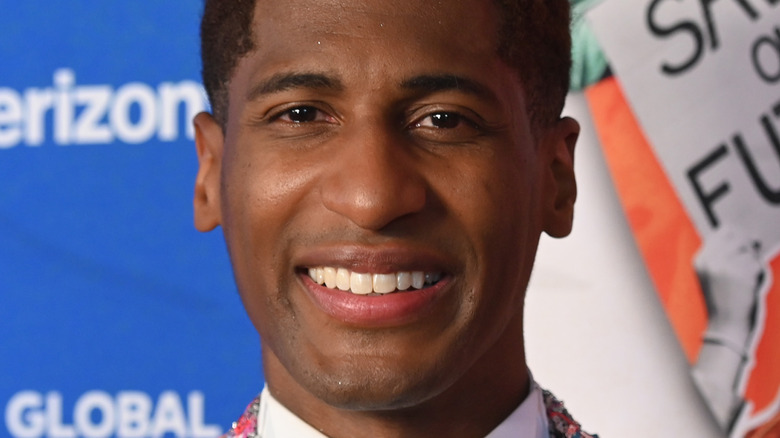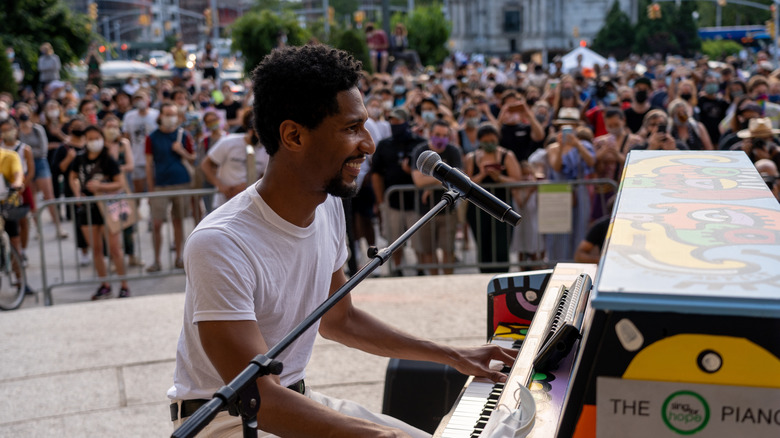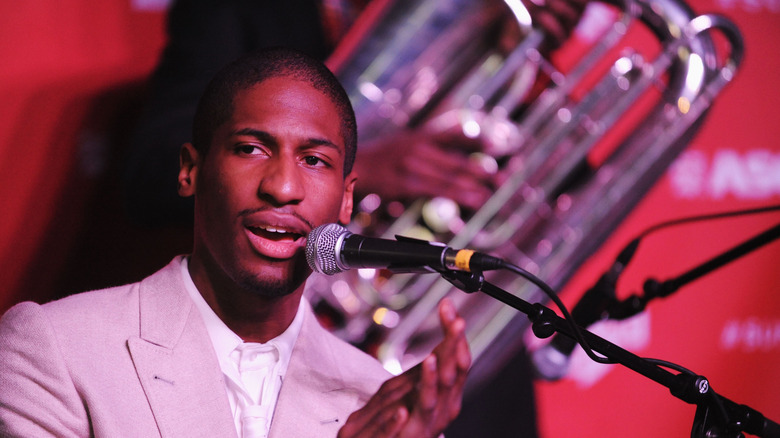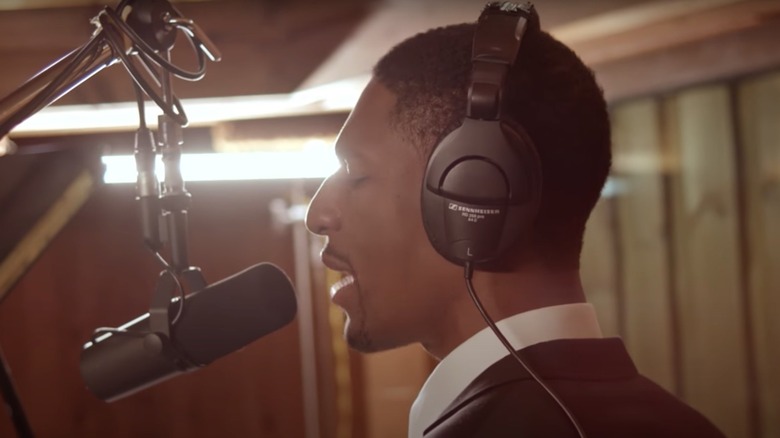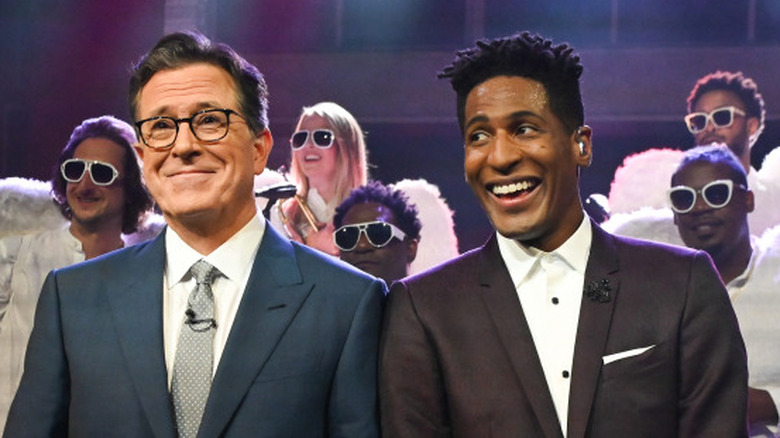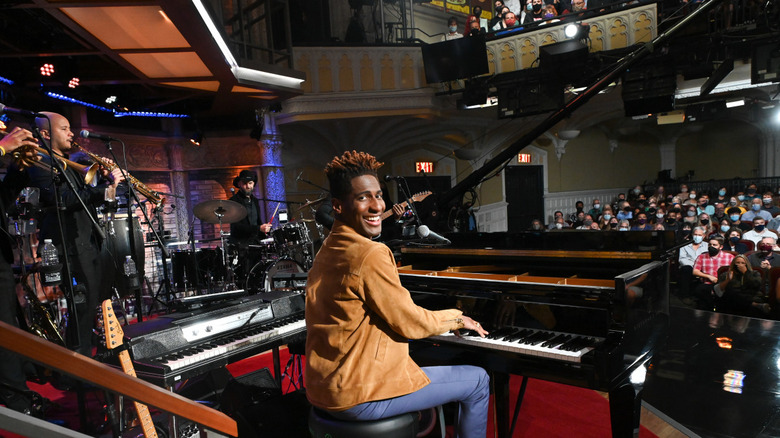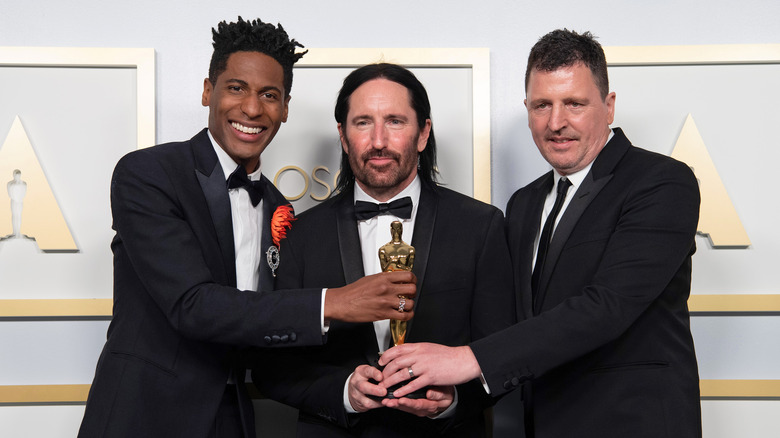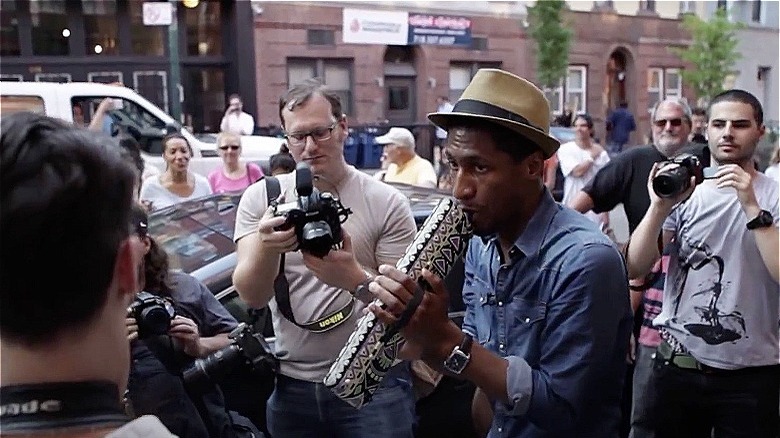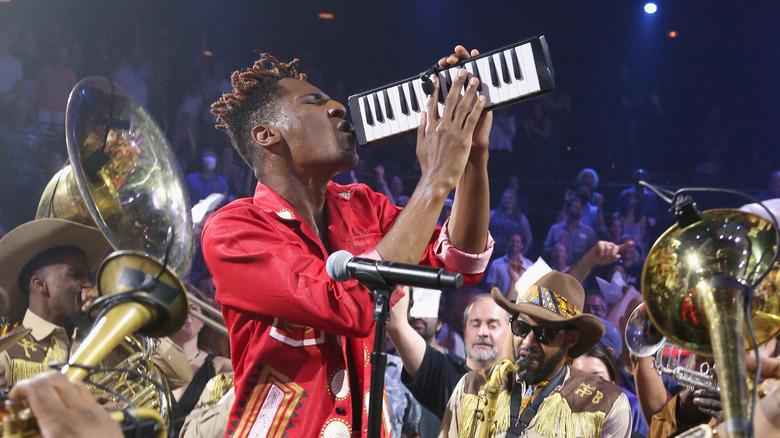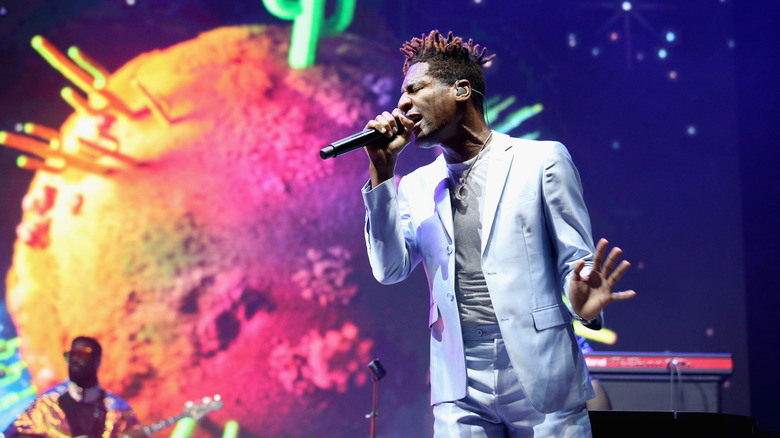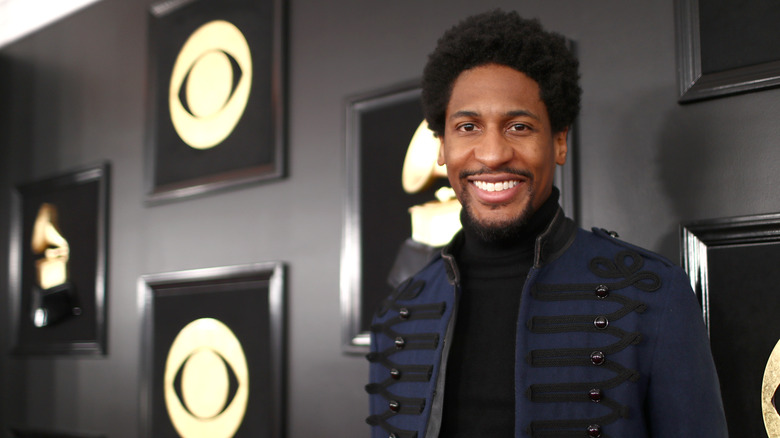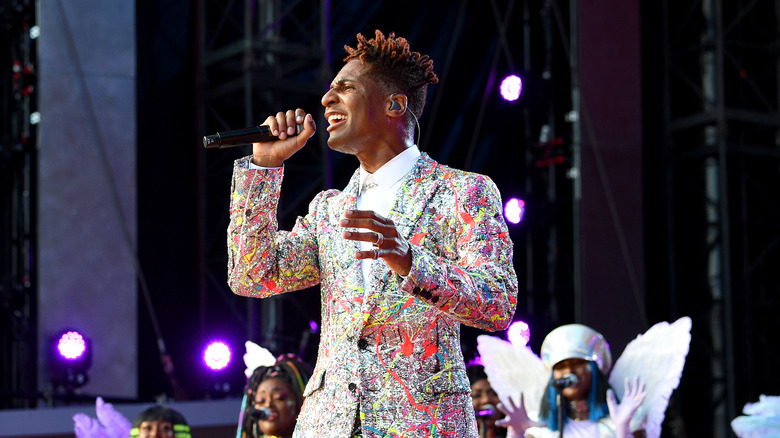The Untold Truth Of Jon Batiste
Ever since he was hired as bandleader for "The Late Show with Stephen Colbert," Jon Batiste has become a household name to TV viewers who end their evenings watching the popular late-night show. What casual watchers may not realize, however, is that there's a lot more to Batiste than that; as a People profile pointed out, he's also a multiple Grammy nominee who's recorded numerous albums and collaborated music royalty, including Stevie Wonder, Prince, Willie Nelson, Mavis Staples, Ed Sheeran, and many more.
A native of the New Orleans suburb of Kenner, he once told The New York Times that music is something he holds in the highest regard. "Music has always been a way for people to endure hardship and figure out how to really connect to their humanity or affirm their humanity when everything around them is trying to squash their humanity," he said.
Despite becoming a ubiquitous presence on late-night television, fans of this wildly talented artist may not know as much about him as they think. Read on to find out even more about the untold truth of Jon Batiste.
Jon Batiste is part of a New Orleans musical dynasty
In New Orleans, Jon Batiste isn't just the Grammy-nominated bandleader of "The Late Show with Stephen Colbert," he's also the scion of a musical clan dubbed the city's "Royal Family of Music," whose members have been bringing the groove to the Big Easy for generations. As NOLA.com pointed out, Batiste is part of a New Orleans musical dynasty that includes such relatives as Jamal Batiste, David Batiste, Russell Batiste Jr., and Damon Batiste, while other famous members of the family have included the late "Uncle" Lionel Batiste (of the Treme Brass Band), Milton Batiste (who led the Olympia Brass Band), and legendary musician, composer and producer Harold Battiste.
Growing up in such a rich musical environment, Batiste came to realize that music is about a lot more than just notes and time signatures. "I'm from Kenner, Louisiana, where music is played for every occasion in life," he said in the Wall Street Journal. "There's music for being born, there's music for dying ... It's just natural. Families get really good because they play a lot together."
He released his first album before college
Most musicians talented enough to be accepted into New York City's famed Juilliard School will take what they learned in that storied institution and bring it to the stage and the recording studio after graduation. Jon Batiste, went a different route, recording his first album, 2005's "Times in New Orleans," when he was just 17, prior to starting at Juilliard. A review for All About Jazz described the album as "a debut disc that would be excellent even if it were his fourth, fifth or sixth outing," presciently predicting Batiste would "mature as a composer, arranger and performer and continue to develop his own voice."
Moving from the Big Easy to the Big Apple, he told All About Jazz, was a "big shift" for the teenager. "It was like coming to the epicenter of art and culture," Batiste explained.
While attending Juilliard, Batiste also got to know another New Orleans native, trumpeter Wynton Marsalis, who served as Managing and Artistic Director of Jazz at Lincoln Center. "I don't know another person in New York who's from Kenner," Batiste said in All About Jazz. "We have that mutual connection. The Batistes and the Marsalises are very big musical families in the New Orleans area. We went to the same schools and had a lot of the same instructors. I met him in New Orleans as a kid, and then when I came to Juilliard, I started to play with him."
His unlikely source of inspiration
It would be easy to assume that Jon Batiste's fondness for jazz came about through being immersed in it as a member of one of New Orleans' most celebrated musical families. However, that's not quite the way it happened. As he told The Washington Post, during his formative pre-teen years he was obsessed with video games, both for the gameplay and the tunes. "The music of the games is very important to me and it taught me a lot about music and life and everything in between," he said.
Speaking with the Wall Street Journal, Batiste recalled how he and his cousins would play video games together, and eventually "were transcribing the music on the soundtracks." Video game music, in fact, continues to be a source of inspiration, something Batiste demonstrated when he and his band Stay Human performed music from "The Legend of Zelda" during a 2019 edition of "The Late Show with Stephen Colbert." Some of his favorite video game melodies, he told Rolling Stone, come from such titles as "Street Fighter Alpha," "Final Fantasy 7," and "Sonic the Hedgehog."
It was through the 1959 album "Sonny Stitt Sits In With The Oscar Peterson Trio" that he first gained an appreciation for jazz, he recalled to Rolling Stone; since then, noted Mint Lounge, Batiste's musical influences have run the gamut, ranging from jazz icon Thelonious Monk to singer Marvin Gaye.
He reimagined a historic song
Even the most casual fan "The Late Show" has certainly witnessed Jon Batiste's propensity to take familiar songs and reimagine them with bold new arrangements. While he's been particularly fond of doing that with video game music, he's also put his own unique spin on the iconic Civil War-era anthem "The Battle Hymn of the Republic."
That came about when he was approached by The Atlantic in 2017 to record the song for the magazine's podcast, "Atlantic Radio." As Batiste noted, he approached the song with the understanding that it "is a part of American mythology and is a true mashup of cultures." In an interview with CBS's "Face the Nation," Batiste explained that he decided to keep the song's "march tempo" but decided to experiment with other types of marches, such as "the New Orleans second-line march with the bamboula rhythm." As a result, he "took the concept of the march intentionally but filtered it through a few other experiences."
Growing up in New Orleans, he added, led him to gain an appreciation for "the power of two different types of cultures or two different worldviews coming together and not agreeing or coexisting," something he deliberately placed "in the foreground of the arrangement of the 'Battle Hymn.' And you hear that. Those elements blending together. And I think it's beautiful."
Becoming The Late Show bandleader
Back in 2014, Jon Batiste and his band Stay Human were booked to perform on Stephen Colbert's Comedy Central show "The Colbert Report." Speaking with KTLA News, Batiste pointed out that he and Colbert "first met on camera." Batiste recalled joking to Colbert that everything he did was tightly scripted while he was all about improvisation, which Colbert seemingly accepted as a challenge when he tossed aside the index cards containing the questions he was supposed to ask. Colbert then conducted the rest of the interview "two inches" from his guest's face, which Batiste felt "turned into this kind of performance art sort of thing."
As the old saying goes, timing is everything; Colbert was on the cusp of taking over "The Late Show" from departing David Letterman, Batiste told SiriusXM, while the musician had just come off a lengthy tour. Batiste was "really looking at signing a record deal and going back on the road" when his pal Colbert approached him about becoming his bandleader, an offer he accepted.
Being on a late-night show wasn't something that had been on Batiste's radar until Colbert came calling. "It was kind of one of those things where it's completely not what both of us were expecting, and it just came together," he shared with SiriusXM.
His demanding The Late Show schedule
Jon Batiste faced a huge learning curve when he was hired as bandleader on "The Late Show," a gig requiring an array of other elements beyond his talent as a musician and performer. To illustrate that, Batiste walked Vox through a typical day behind the scenes of the late-night show.
"It's a long day," Batiste said, noting that each morning typically kicks off with the show's writers pitching ideas to host Stephen Colbert. By the time Batiste arrives, he'll "start to get a sense, just from what's buzzing around the building, what people are talking about." Based on that, Batiste will then create a list of songs he'll want to play during the show, carefully selected to offer a musical "commentary" on the jokes, and get clearance to perform them on the air. While this is happening, Batiste is also composing new music that he and Stay Human will play during the commercial breaks.
In addition, Batiste is often enlisted to interact in sketches with Colbert and his guests, referencing a video he made with Dua Lipa in an elevator as an example. "There's a lot of intensity to get it in the can in a couple of takes," he said of how quickly those pieces need to come together. This part of his job has actually unleashed Batiste's inner comedian. Whether it be a musical number about the excuses one could use when they don't want to go out or a nine-step piano tutorial, Batiste sure delivers good content.
Working with an industrial music icon
It's no understatement to point out that Jon Batiste burns the candle at both ends. In addition to his "Late Show" role, live performances, and recording music, Batiste teamed up with former Nine Inch Nails frontman Trent Reznor and writing partner Atticus Ross to compose music for the animated Pixar movie "Soul."
As Variety noted, Batiste's jazz compositions were used for the music played by the film's protagonist, aspiring jazz musician Joe Gardner, while Reznor and Ross composed the music in the afterlife known as the Great Beyond, which Reznor described as "ethereal, synthetic and meticulous." For Batiste, "Soul" proved to be the ideal screen project. "Joe Gardner represents many of my beliefs about jazz and the way it can take you and the audience to a special place tied into our spirit and soul," Batiste told Variety. "That's when we're tapping into the spark that makes us all unique individuals." Asked at the time whether he saw any award nominations in his future, Batiste replied, "Working on this film has been award enough for me."
As it turned out, not only did Reznor, Ross and Batiste receive an Academy Award nomination, they wound up winning, making Batiste only the second Black composer to take home an Oscar. On top of that, he told Time he's received "Endless letters, endless DMs, endless emails" from people who were inspired by "Soul" to pick up an instrument.
His street performances are 'love riots'
One aspect of Jon Batiste's live performances that differentiates him from other performers is his practice of taking his music out on the streets — literally. In an interview with NBC News 4, Batiste explained why he'd come to dub these impromptu street performances "love riots." "There's love that's spread between everybody through the music and it's sort of like a riot because we stop the street," he said.
His intent, Batiste told Interview, is "to take [jazz] outside the context of the concert hall and take it to the street without watering it down. People don't dance to jazz anymore and that's one of the problems," he said. Performing in the street, he told NBC News 4, allows him and Stay Human to bring their music to people who might otherwise not be exposed to it. "It's like a captive audience," he explained.
"They may not have had the ability to see us at Carnegie Hall or something like that so we bring the music to them," Batiste said in an interview with "CBS Sunday Morning." One interesting facet of Batiste's street performances, he told Okay Player, is that not even he knows when they're going to happen. "I'm so spontaneous with the love riots," he said. "A few of our friends and people we know come out, we gather in a spot, and we just kind of let community percolate and see what happens."
He turned the NYC subway into a studio
In addition to hitting the streets of New York with his love riots, Jon Batiste has also taken his show far below the streets, to the city's subterranean subways. Back in 2012, before he'd even met Stephen Colbert, Batiste spoke with the Village Voice about how he and Stay Human decided to perform for passengers in the NYC subway cars. "I'm doing this for an artistic reason," Batiste explained. "Jazz performances can seem esoteric, like an experiment or a recital. Here, there's no hat passed around. We're not practicing, either. We're playing at the highest level we can. And we're doing it two feet from your face, right where you live."
In fact, his 2011 album with Stay Human, "My N.Y.," is comprised entirely of these subway performances. "This is where we really live," he told the Voice.
One thing about the "My N.Y." album that should be noted is that, had Batiste and his band followed the letter of the law, it would not exist. However, Batiste encountered some members of the NYPD who were music fans. "We were playing on the L train once and a police officer said we had to stop, but everyone else was saying, 'Let them play, let them play.' He broke out into a smile and said, 'This is against the law, but it shouldn't be," Batiste recalled in an interview with the New York Post.
What can't Jon Batiste live without?
During his frequent travels, Jon Batiste told GQ, he has 10 essentials he always brings with him. The first of these is a Polaroid-style instant camera to document the amazing moments he gets to experience. Noting that he's "a gamer through and through," Batiste also carries a portable Super Nintendo Mini video game system with him. He also finds shoe insoles to be "very, very essential," given that his "particularly flat" feet can use the extra support.
He also shared the array of clothing he takes with him when traveling, ranging from comfy sweatpants to stylish stage outfits. He also brings several sets of grills, which feature "actual gold and actual diamonds," purchased at a place recommended to him by rapper A$AP Rocky. Other items he displayed included canned red kidney beans (eating "beans on Monday is a tradition that we can never forsake" in New Orleans, he explained), and some "show day dressing room essentials" including a back roller, manuka honey, throat-coating tea, lozenges, lip balm, and a head wrap.
Batiste also brings a number of books with him, while another essential is his familiar harmoniboard (which, he noted, is also called a melodica or melodyhorn). The 10th and final item in his travel arsenal, he revealed, is his cellphone. While he loves having a smartphone on his person, he told the Wall Street Journal in 2017, "There are days when I wish I could just have a flip phone."
His music transcends genre
While Jon Batiste's music is typically categorized as jazz, it's actually not so easy to pigeonhole, given his tendency to blend influences from multiple genres. That, he explained in an interview with Atwood Magazine, is entirely by design. "I think a lot of the music that we make fits into genres, and I wanted to make music that was not going based on that system," he said of his 2019 album "We Are," which he characterized as "a representation of genreless music" that's "not trying to fit into any box or anything like that."
That philosophy is one that typifies his hometown of New Orleans, he told Entertainment Weekly, where a unique form of music evolved over time from "this blend of Afro Caribbean sounds, and the sounds of the enslaved people, and Irish Celtic music, and French sounds and instruments."
As a result, Batiste added, mixing varied genres ranging from hip-hop to B&B into a musical melting pot was something that "felt really, really natural." The key, he divulged, lay in an artist finding his or her musical voice, which then allows the freedom to experiment within it. "You can play a song in a style people have never heard from you before — it could be dubstep, EDM — and it'll sound like you because you found this center of yourself, and it is a core that doesn't change," he said.
Jon Batiste has a lot Grammy nominations
Winning his first Oscar in 2021 for his contribution to the Pixar film "Soul" may have seemed like a pinnacle for Jon Batiste at the time. As it turned out, however, that was just a warmup for what came later that year when the Recording Academy released its nominations for the 2022 Grammy Awards. Batiste received not just one nomination, but 11 of them. This, noted The New York Times, was the largest number of nominations received by any artist that year, which saw him nominated in multiple categories, including Album of the Year in addition to nods in the jazz, R&B, and American roots categories.
"My goodness, I'm so over the moon," Batiste told the Times of his multiple nominations, eight of which sprang from his album "We Are," with the remaining three for his music in the Pixar film "Soul." "I've always made an effort to show that the genres are all connected, just like people in all of our lineages are connected ... it just feels so great for it to be recognized on music's biggest stage," he added. Being nominated in such a diverse field of categories was vindication of his refusal to be pinned down into any one musical genre. "I don't even think genre exists," he told the Recording Academy in June 2021. Clearly, that mindset has worked rather well.
Jon Batiste has an impressive net worth
Jon Batiste has been a successful working musician since graduating from Juilliard, and has managed to do quite well for himself in the years since then. When the proceeds from his record sales and touring are added to his "Late Show" salary, Celebrity Net Worth estimated that he's sitting on a tidy $4 million fortune.
While money has never been a motivating factor, Batiste doesn't skimp when it comes to spending it. That, he told the Financial Times, is particularly true whenever he returns to New Orleans — and even more so when it comes to the city's distinctive cuisine. "Food is central to experiencing the city and you have to go all in — it isn't about being healthy," he said.
When visiting his hometown, he's happy to indulge by staying in one of his favorite places in the city, the Hotel Saint Vincent, co-owned by fellow musician St. Vincent. As he explained, the hotel — located in the city's famed Garden District — "feels very cool, with a beautiful courtyard and a French-Vietnamese café."
He has a longtime girlfriend
While the past decade has been a whirlwind for Jon Batiste, he hasn't been experiencing it alone. Joining him on this journey has been his longtime girlfriend, author and journalist Suleika Jaouad. While Batiste has long displayed a tendency to keep his personal life private, he made a rare exception on the song "Show Me the Way" from his album "We Are," which is not only about the couple's relationship but also samples her voice. "It speaks to a lot of me growing up and also our relationship," Batiste told People of that track. "It's a beautiful thing to have that piece of our relationship sliced off into the album."
While quarantining during COVID-19 has led to the end of numerous relationships, Batiste declared that the opposite had proven true in their case, insisting they'd only grown closer while hunkered down together. "Obviously there's so much loss that we've faced individually and collectively," he said of the pandemic, "but I find that this time has also been a blessing in that it gives us a break to be with each other."
Another thing that deepened their bond was Jaouad's cancer diagnosis at age 22, something they faced together (as of 2021, she'd been in remission for several years). Going through that experience, she told Hoda Kotb's "Making Space" podcast, showed her that "Jon is someone who shows up in the difficult moments and who keeps on showing up."

